Let’s rewind the clock back to 2015. I was a senior in college, America wasn’t being run by a long-expired clementine, and nobody could stop talking about Star Wars since trailer after trailer kept teasing out exciting new information. Mostly, it looked like a return to the Star Wars that people like, even though the prequels definitely have their fans. I myself was pretty excited about it. I was going through something of a rough patch and needed something to take my mind off things. So I saw The Force Awakens.
It was pretty good.
Sure, it’s mostly just a soft reboot of A New Hope, but it worked as a reintroduction to the franchise after the mess that was the prequel trilogy. The way it ended, with Rey holding Luke’s lightsaber out to him, had me and many others excited for what was to come. It teased a new story set in the beloved universe, a continuation of everything that makes the original trilogy such a great series.
Fast forward to now. The Rise of Skywalker can generously be described as being a “hot mess” and more accurately described as “a rather large dumpster fire.” No, it’s not the worst movie ever made. It’s not even the worst movie in the franchise. But, to me, the way this sequel trilogy wound up playing out is indicative of a larger problem in pop culture: relying on what’s come before to a fault.
New and original stories are being told across all mediums, from TV to films to books to video games, but there’s no denying that movies, in particular, have been relying so heavily on nostalgia that that story suffers for it. Join me as I ruin everything.
I’m assuming that if you clicked on this article, you’ve seen the sequel trilogy. If you haven’t and don’t want things spoiled for you, turn back, because this was written under the impression that you’ve seen it, and there will be spoilers.
Where the Sequel Trilogy Went Wrong
I’m going to say this upfront: The Last Jedi is perhaps the most interesting Star Wars movie to discuss. Mind you, it’s not the best. For me, it’s probably in the middle of a potential ranking of all the films. But the reason I say it’s the most interesting is that it was a wildly risky follow-up to the fairly safe The Force Awakens. It tried to do its own thing at pretty much every turn and tried to subvert expectations whenever it could.
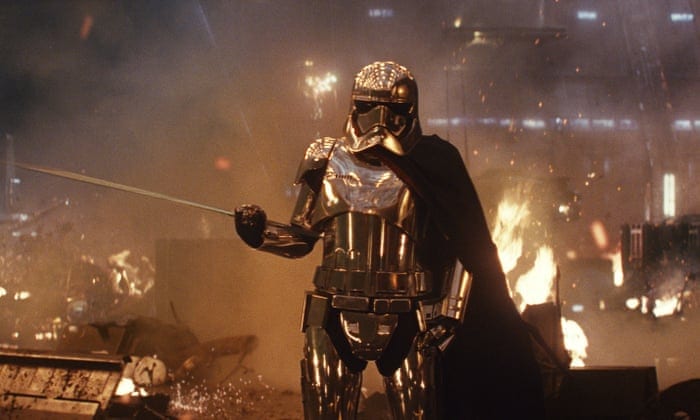
Of course, like overuse of jump scares, constantly trying to subvert expectations turns what is supposed to be unpredictable into something predictable. Many of the ways it tried to catch the viewer off guard came across as silly or flat out dumb, like with the final defeat of Phazma, which turned what could have been a cool character into a bad inside joke, or literally anything on the planet Canto Bight, which felt like it was ripped straight from a low-quality kid’s movie.
There was stuff that worked, though. Throughout TFA, Rey’s origins were teased, leading fans to theorize about who she could be. Was she a Skywalker? A Solo? A Kenobi? According to TLJ, her parents were nobody. There was a lot of uproar about this, but personally, I was fine with that. The idea that someone born so powerful in the Force was a powerful one. Thematically, it was saying that your heritage and history have nothing to do with being a hero. Instead, heroes are defined by their actions. Keeping Rey as someone with no blood ties to other characters in the series would have been a nice twist on the hero’s journey. I had similar reactions to Snoke just being some dude. I could accept that he was a disfigured dark side user who rose to power in the decades between the originals and the sequels. Again, he doesn’t need to be directly related to anyone to work.
The most tantalizing idea thrown around in TLJ was when Kylo Ren (AKA the only good part of Rise of Skywalker) offered an alternate path between the light side and the dark side. He stated that they could eschew both and forge their own, new path, and them seemingly destroying Luke’s old lightsaber was representative of them doing just that.
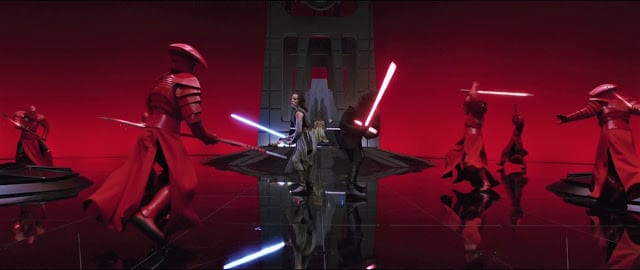
Then the ending happened, and it was another Resistance vs First Order conflict (side note: the whole Resistance thing is very poorly explained in this series; if the Empire was defeated, shouldn’t the Resistance just be the New Republic? Wouldn’t that actually make the First Order the Resistance?). Kylo Ren was back to trying to get the good guys, and the good guys escaped. It was kind of a let-down since the two of them forging their whole path could have been a really neat workaround and acknowledgment of the ethical holes present in the movies (Don’t believe me? Consider the fact that the Jedi willingly led what amounted to fully grown child soldiers into battle during the prequels). It would have been a nice way to develop the story in an interesting new direction by using TFA as a springboard.
Then, of course, Rise of Skywalker happened. Not only did RoS repeat many of the mistakes found in Return of the Jedi, it repeated them in a worse way. The extended cast of characters like Poe and Finn was given absolutely nothing to do until the final… third of the movie or so, which is a shame since they were all generally played very well. The entire first half of the movie is a bizarre race-to-the-Macguffin story that only gets more eye-rolling and tedious as it goes on. Up to this point, the series had actually done a decent job of not relying so heavily on Macguffins, which is an easy pitfall for fantasy storytelling to fall into.
When it wasn’t being tedious and mind-numbingly fast-paced, it was directly aping the original series. Fans were so “outraged” by the events of TLJ that within the first ten minutes, all of the established stuff about the villains is thrown out the window and it’s revealed that, yep, Palpatine is behind everything. He had clones of Snoke for some stupid reason, he somehow survived the Death Star II blowing up in Return, and he has somehow been orchestrating everything behind the scenes.
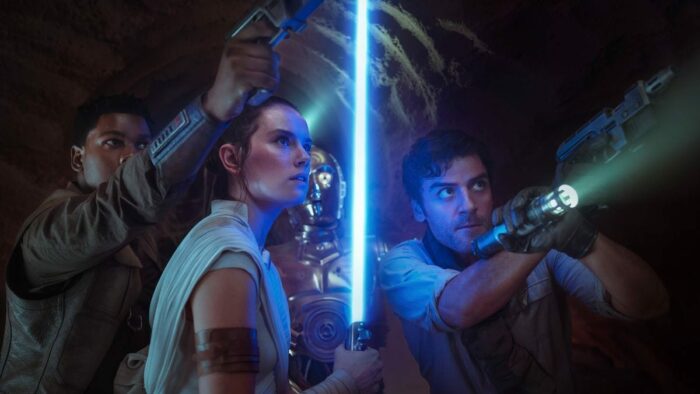
I’ve seen people defend this as brilliant, making him a secret bad guy. It’s not. It’s hopelessly, ridiculously stupid. Not only does it actually cheapen the originals (the end of Return of the Jedi means nothing now), but anyone who tries to reason it as anything other than damage control is kidding themselves. People didn’t like Snoke being offed and left mostly unexplained… so he’s a man cloned by Palpatine! People didn’t like the fact that Rey had no blood ties to established characters… so she’s the granddaughter of Palpatine! That whole first scene came across as the screenwriters saying, “Hey, we were just kidding about all that stuff in TLJ, here’s something you recognize and have goodwill towards.” It was the equivalent of holding a shiny object up to a cat to distract it from the fact that you’re taking it to the vet.
Of course, making Rey a Palpatine also allows the writers to give her a character arc where she has to confront the darkness within her and struggle against it since it’s ingrained in her bloodline… wait. That’s the EXACT story arc Luke undergoes in RotJ. Except the difference is that in RotJ, the storyline was new and fresh. We hadn’t been exposed to years of media from the series. Instead, it was simply the screenwriters telling a story. Here, it smacks of desperation, like the screenwriters were doing whatever they could to try and win back fans, and their decision was to simply show them things that they’re familiar with.
Then there’s Kylo Ren who has the exact same redemptive arc as Vader in the original trilogy. The only reason this storyline works at all is that Adam Driver was consistently the strongest part of the new trilogy, giving a great performance as a troubled, conflicted man. It still doesn’t change the fact that they couldn’t think of anything else to do with him besides have exactly what happened to his grandfather happen to him as well, with him eventually sacrificing himself to save the hero who is in danger of being killed by Palpatine.
This attempt to retcon things that angered fans in the second movie of the sequel trilogy completely eliminated all goodwill I had felt towards this new series. It squandered characters and potential storylines we spent several hours with up to that point in favor of desperately appealing to fans’ nostalgia, and the story as a whole suffered for it.
Back in 2015, The Force Awakens took the world by storm and served as a reminder of why people love the franchise. In 2019, Rise of Skywalker ended the sequels with a stupid finale that retroactively ruins the overall plot of the beloved originals.
The Problems This Shows
We live in the age of reboots and nostalgia baiting, and that’s not really a good thing. I’ll get to instances where this works in a moment, but it shows that filmmakers are willing to forgo any kind of narrative vision or consistent storytelling in favor of selling tickets. It is such blatant pandering that it is, quite frankly, insulting.
But it also shows that fan bases are part of the problem. All of the creative decisions made in Rise of Skywalker were direct reactions to the negative fan response TLJ received upon release. It is so, so easy to forget that there was a time when no one knew what Star Wars was. The original series was written as a means of telling a story (and to sell toys). If you go back and rewatch The Empire Strikes Back, it’s quite frankly shocking how little action there is in it. Instead, it’s a slow burn, character-driven piece of space opera that works because it gets the viewer emotionally invested and provides an absolutely killer plot twist. That movie, in particular, is a huge reason that the franchise has so much love from fans. It’s an example of what you can do with a blockbuster movie when you’re trying to simply tell a story.
It’s why the sequels, particularly RoS, feel so hollow. The final movie is so reliant on what’s come before that it loses sight of the fact that a movie’s first job is to just tell a good story. Fan reaction to the movie, from what I’ve seen, has been mixed, but those who defend it seem to like it because it delivers on fan service. Look, I like fan service, but not when it actively hampers whatever story it’s in. And RoS is nothing but desperate pandering to fans. It shows that you shouldn’t always listen to the masses. Sometimes, giving the people what you think they want is not the right move.
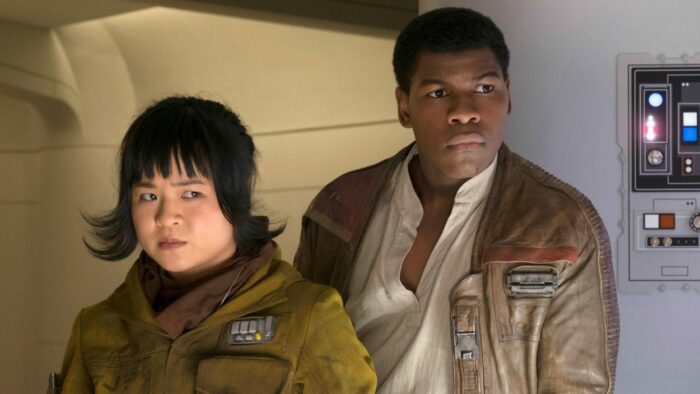
That’s not even touching on fan interactions with the cast, which were downright vile. It’s well known that Daisy Ridley and Kelly Tran both left social media because of fans slinging sexist, racist, and all kinds of other fun comments their way. Fans were saying just disgusting things over a movie, and they were directing it at people who had no part in the way the movies were written. Both actresses did a pretty good job from a performance standpoint, even though Rose in TLJ was very poorly written.
In this day and age of pop culture revivals and banking on nostalgia, creators are losing sight of what makes whatever is being revived so loved in the first place. Fans fell in love with the original Star Wars movies for their dazzling spectacle and emotional, high stakes storytelling. These new movies started out strong but went down in flames rather quickly because of poor storytelling and blatant fan pandering. It’s such a tough line to walk with these revivals, and in my experience, more often than not they go the way of Star Wars.
Of course, that leads me to one final point…
The Mad Max Problem
Every once in a while, you get a reboot or decades-later sequel that not only measures up to the originals but surpasses them. I’m talking, of course, about the 2015 action bonanza Mad Max: Fury Road. It was everything fans expected from the series: fast-paced world-building, a grimy, handcrafted post-apocalyptic aesthetic, and amazing car chases. Except, it did all of that better than ever before. It told a simple but effective story and had some of the best practical action scenes ever put to screen. It truly is a two-hour car chase, and it maintains that energy the whole way through. It’s pure awesomeness.
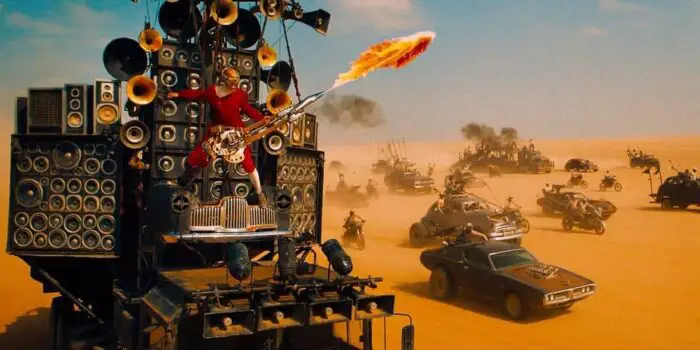
But it all works as a reboot and as an entry in the series because it strikes the balance of feeling like other movies in the series while still doing its own thing. The aesthetic was unmistakably Mad Max, and the car chases were bigger and better than ever. But the story, simple as it was, didn’t rely on what came before. It had a brand new cast, save the eponymous Max, and told a nice self-contained tale in its universe. It showed that you can do a successful reboot and still have it work as a movie. It’s almost like if you tell the story well, then it’ll be good.
Then, of course, there was a little show called Twin Peaks you may have heard of that had a 2017 reboot on Showtime. This was almost the anti-reboot. Not only does it literally happen 25 years after the original series, but it picks up directly where the originals left off and expands on the whole universe with brand new characters, new conflicts, new world-building, and entirely unexpected twists. It even feels different from the original show but is still unmistakably Twin Peaks: something both wonderful and strange.
Both of these examples show that in order to do a reboot right, you have to have some kind of story to tell and you have to tell it well. You can’t rely on familiarity and nostalgia for a story to be a success. As someone who loves Star Wars, I’m done with the series for the foreseeable future. To me, the direction the sequels went shows that Disney was just trying to milk a franchise rather than tell another good story. Sure, movies need to make money. I don’t begrudge them that. But when the fan service and attempts at nostalgia are as blatant as they are in the sequel trilogy, it’s insulting and eliminates any goodwill towards that series. I want new stories. New characters. New conflicts. If all of that is within an established canon that I enjoy, all the better.
But for the love of God, Hollywood, stop showing me stuff that I’ve already seen.



Fuck you Disney, I love the prequels, and I hate Rey with all my heart